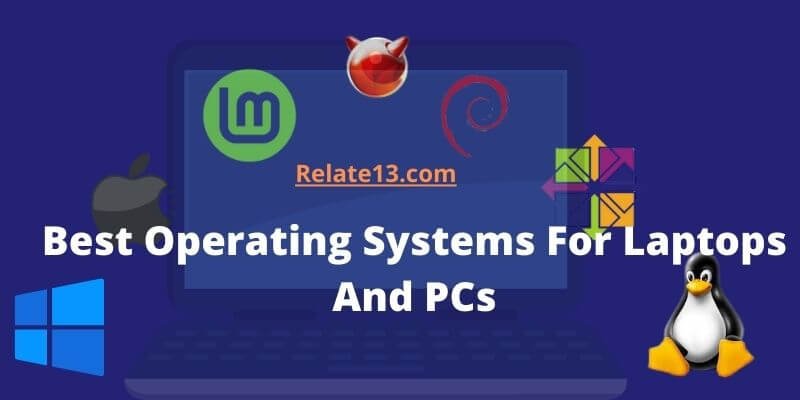Are you a gamer, a creative professional, or simply need an OS that can handle day-to-day tasks? and you must be thinking about choosing the right and best operating systems for the smooth functioning of your system. I must say that it’s very important to find the right operating system that fits your specific needs and requirements.
Every piece of software requires compatibility to be run but sometimes we choose the wrong operating system, due to which we won’t be able to run the software on our PC or laptops. As we know, technology is changing so we also need to upgrade our operating system.
Do not worry now because, in this article, I will introduce you to the top 10 operating systems for laptops and PCs and help you decide which one is right for you.
10 Best Operating Systems List for Laptops and PCs
The list of different operating systems used worldwide can be uncountable but these top 10 will catch your eye for sure!
1. MS-Windows

Microsoft’s Windows is a deserving operating system to get first place. This is one of the old and most popular operating systems. It has come a long way from Windows 95 to Windows 11 fuelling the computer system worldwide.
The operating system has a clear interface and doesn’t slow down your computer a bit. It is continuously updating and making sure the consumer will get the full experience of Technology. Also, it will keep your data safe and handle your security very well. While talking about the functions,
Windows offers a plethora of useful functions like task view, different user interfaces, multi-factor authentication Technology, compressing system, tablet mode, and many more. I won’t explain much because I know you are well aware of Microsoft Windows features. It is plain and convenient for users to operate and will be worth your money.
MS Windows operating system has many versions Windows 7, Windows 8, and Windows 10, the latest version of Windows is Windows 11 21H2, which is launched in 2021.
How does it work?
Windows have many utility functions. It is a pre-loaded function, which is having multiple applications in it. When you buy a new computer or laptop your windows are always in that, you can also change the version if you don’t like it.
In Windows, the default web browser is Internet Explorer. Maybe, the upcoming versions will change their default setting. But default settings are really good.
Pros of MS Windows:
- Widely compatible with software and hardware
- A popular choice for gaming, with support for DirectX
- User-friendly with a graphical user interface
- Offers productivity tools like Microsoft Office
Cons of MS Windows:
- Vulnerable to malware and security threats
- Requires a license to use, which can be expensive
- Comes with pre-installed software that can take up storage space
- Has faced criticism for collecting user data without consent.
2. Mac Os
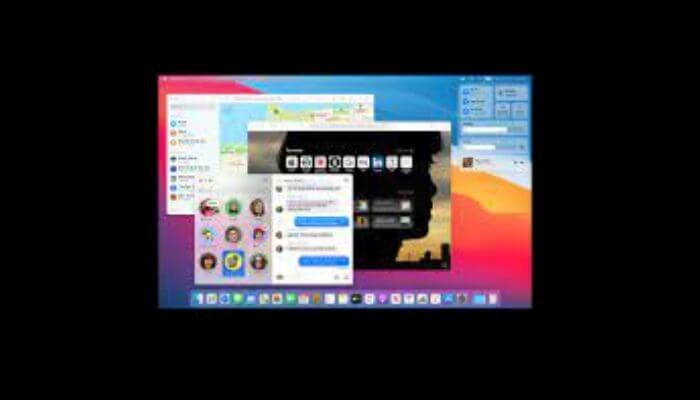
Mac’s operating system is known for its simplicity. It has an easy interface and has the ability to be learned easily. Not just easy, but the Mac interface is quite appealing too. If someone has used Mac Operating System once, they won’t think to go anywhere else.
One thing special about Mac is it has integration with other iOS devices. Anything from your iPhone or iPad will automatically sync to your Mac computer. Mac’s operating system has gained trust from time to time by not being vulnerable to malware and viruses.
You have to make an extra effort to install 3rd party apps on Mac devices. Moreover, Apple is ranked continuously as one of the best companies which have superior customer support.
How does it work?
It has a wide range of essential pre-loaded apps. It is an ideal operating system for multitasking. Mac works with specific hardware. You can store many photos, videos, and applications too. Really, it comes with amazing features.
Pros of Mac OS:
- User-friendly interface with a sleek design
- High-quality hardware with long-lasting battery life
- Built-in security features that prevent malware attacks
- Integration with other Apple products for seamless syncing
Cons of Mac OS:
- Limited software compatibility compared to Windows
- Higher cost for hardware and software
- Limited upgrade options for hardware components
- The closed system limits customization options.
3. Ubuntu

The software is best for open-source downloading, running apps, and browsing games. You won’t be charged a penny for the software. Moreover, It is part of a Linux family.
Speaking of its advantages, you will find Ubuntu free of cost and the software is perfect to use for personal and professional use.
Most of the time the users can avoid the hassle of installment and updating as they don’t need to restart their computer again and again for updates. The process will automatically run in the background and will pop up a notification when done.
Only quirk you will find us in order to use Ubuntu you need to be tech-savvy. Not all can use Ubuntu and give a command line.
How does it work?
It’s a free OS for all systems. Ubuntu helps the software to work properly. It also includes so many functions and features also has the feature to fix problems easily, so that you will have to face no problems. It is one of the fastest Operating Systems for laptops and Pcs.
Pros of Ubuntu:
- Free and open-source operating system
- High level of customization and flexibility
- Supports a wide range of software and hardware
- Built-in security features that prevent malware attacks
Cons of Ubuntu:
- Limited official technical support
- Requires more technical knowledge than other operating systems
- Fewer pre-installed applications than other operating systems
- May require additional software installation for full functionality.
4. Fedora

Fedora is another part of the Linux family that used the Anaconda installer. It uses a GNOME Desktop Environment by default. Fedora Workstation is a polished easy-to-use operating system for laptop and desktop users. It has a complete set of tools that a developer or maker needs.
Other than that Fedora server is a powerful flexible operating system that includes the best and latest data center Technologies.
It is an innovative free and open-source platform for hardware, cloud, and containers that enable software developers and community members to build a tailored solution for the users.
How does it work?
Fedora is a Linux operating system. The default web browser for Fedora is Mozilla Firefox. In this Operating System, you can see multiple options and pre-defined various menus, so that you can easily get compatible with this operating system.
Pros of Fedora:
- Free and open-source operating system
- High level of customization and flexibility
- Supports a wide range of software and hardware
- Regular updates and new features
Cons of Fedora:
- May require more technical knowledge than other operating systems
- Fewer pre-installed applications than other operating systems
- Limited proprietary software support
- Smaller user community compared to other Linux distributions.
5. Chrome operating system
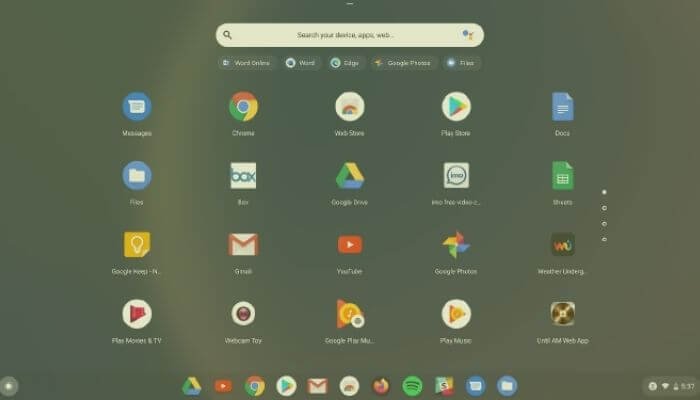
Chrome is not just a browser but software too. It is a Linux Kernel-based operating system that is specifically designed by Google. This software basically used in Chromebook and Android applications.
Chrome is free software that uses the Google Chrome web browser as its principal user interface. It also has an integrated media player and file manager that supports progressive absence.
If you are interested in the Chrome operating system it is only available pre-installed on hardware from a Google manufacturing partner but there are also official methods that allow you to install it on other equipment.
Its open-source upstream chromium operating system can be compiled from downloaded source code. Earlier it was considered the Rival of Microsoft but now both are used for different purposes.
Pros of Chrome OS:
- Fast and lightweight operating system
- Built-in virus protection and automatic updates
- Easy integration with Google services such as Gmail and Google Drive
- Simple and intuitive user interface
Cons of Chrome OS:
- Limited offline functionality
- Fewer software options compared to other operating systems
- Limited customization options
- Requires an internet connection for full functionality.
6. Solaris

Solaris is a free operating system based on Unix. Sun Microsystems developed Solaris in the mid-’90s and was renamed it in 2010.
Solaris is popular among its users for its scalability and performance advantages. You can blindly choose Solaris, among others if you are more into security features and rights management.
It is the best open-source operating system and the industry that offers interoperability data management security and unlimited capability to file systems and databases.
It is compatible with modern cloud provisioning and Change management tools, helping you run your cloud infrastructure reliably, securely, and efficiently.
How does it work?
Solaris comes with both interior and Exterior and the Kernel is the root of Solaris. It is supported with SPARK y x86. This OS will be compatible with a multiprocessor.
Pros of Solaris:
- Highly scalable and reliable operating system
- Advanced security features
- Excellent support for virtualization and containerization
- The built-in ZFS file system provides advanced storage management
Cons of Solaris:
- Not as widely used as other operating systems
- Limited hardware compatibility compared to other operating systems
- The steep learning curve for beginners
- Some software applications may not be compatible with Solaris.
7. Cent Operating System

Other than Fedora and Red Hat Enterprise, Linux CentOS streamlet users contribute to the development of the next version of Red Hat Enterprise Linux and enable testing of supported software and hardware in advance of the release.
The CentOS project is a community-driven free software effort focused on delivering a robust open-source ecosystem around a Linux platform.
The CentOS Linux distribution is a table predictable manageable reproducible platform derived from the sources of RHEL. The basic goal is to provide are basic platform for open-source communities to build upon.
Pros of Cent OS:
- Highly stable and reliable operating system
- Strong security features
- Provides excellent support for server applications
- The large and active user community
Cons of Cent OS:
- Not as user-friendly for beginners compared to other operating systems
- Limited software options compared to other operating systems
- Lack of official support from major vendors
- Can have compatibility issues with certain hardware components.
8. Debian
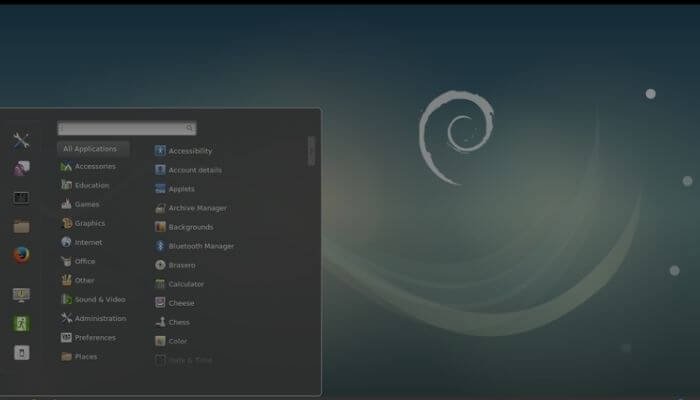
Debian is a Linux-based operating system for a wide range of devices, including laptops, desktops, and servers. They provide a reasonable default configuration for every package as well as regular security updates during the package’s lifetimes.
Debian has extensive hardware support. It shares the same APT packaging as Ubuntu and shares the use number of packages and libraries from Debian repositories. It was basically developed by the Debian project with an open-source model. And it is the oldest operating system based on the Linux kernel.
Talking about its features, it is stable and dependable and you can use each version for a very long time. it has great software support. Devin is much faster and lighter than other operating systems.
Pros of Debian:
- Highly stable and reliable operating system
- The large and active user community
- Excellent package management system
- Supports a wide range of hardware architectures
Cons of Debian:
- Software packages may be slightly outdated compared to other operating systems
- Not as user-friendly for beginners compared to other operating systems
- Limited official support from major vendors
- May require some configuration and setup to get up and running.
9. FreeBSD

Freebsd is a direct descendant of the Unix operating system that Linux is based on.
As well as an operating system that powers free and is one of the most common networks attached storage operating systems and PFsense is a powerful open-source firewall.
The one reason I recommend you to use FreeBSD is because of its speed. It has the fastest IP stack of any operating system by a long shot.
Since it is Unix and you can provide the sun services this means you can provide them faster and learner. Freebsd is also a cap to its kiss; keep it simple, stupid.
Unix routes without compromising features file Linux configuration gets more and more complex. As a force, it is easy and incredibly powerful. There are granule security features on system configuration recovery features and FreeBSD that won’t be found in other operating systems.
Pros of freeBSD:
- Highly secure and reliable operating system
- Excellent performance and scalability
- Advanced networking capabilities
- Provides excellent support for server applications
Cons of freeBSD:
- Not as user-friendly for beginners compared to other operating systems
- Limited software options compared to other operating systems
- May require some configuration and setup to get up and running
- Smaller user community compared to other operating systems.
10. Linux mint
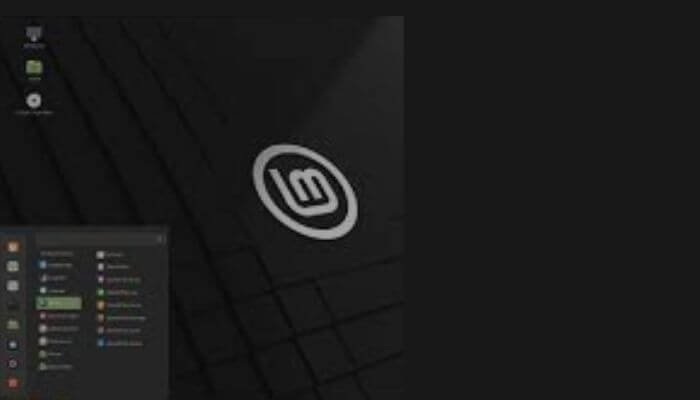
Linux Mint is a reliable and powerful operating system with an open-source operation. You can use a wide variety of free applications that are already installed on your device.
If you use Linux Mint, it is very classy and easy to use. The interface is user-friendly and you will find the latest Linux mint version, Linux mint 20. There are basically three editions available and it is free of cost and open source.
The main USB for Linux Mint is it’s full out of the box and uses a conservative approach towards software updates and making it safe and reliable. You can also use multi-desktop on your system.
The only quirk is that it has no device manager available to manage its operations.
After comparing the above 10 best operating systems I would like to provide you with some Free operating systems alternatives that you can use for your normal work and purposes but if you are a professional then you have to get the genuine version of the operating system.
Free Operating System Alternatives
There are several free operating system alternatives available that you can consider for personal use. Here are some popular options:
- Ubuntu: Ubuntu is a widely used Linux distribution known for its user-friendly interface and ease of use. It offers a comprehensive software repository, regular updates, and a strong community support system. Ubuntu is a great choice for users transitioning from Windows or macOS.
- Linux Mint: Linux Mint is another user-friendly Linux distribution based on Ubuntu. It provides a familiar desktop environment with a traditional layout, making it easy for Windows users to adapt. Linux Mint focuses on simplicity, stability, and multimedia support.
- Fedora: Fedora is a community-driven Linux distribution sponsored by Red Hat. It emphasizes the latest software packages, security, and innovative technologies. Fedora is popular among developers and tech enthusiasts due to its focus on cutting-edge features.
- Debian: Debian is one of the oldest and most respected Linux distributions. It is known for its stability, reliability, and adherence to free and open-source principles. Debian offers a vast software repository and supports a wide range of hardware architectures.
- FreeBSD: FreeBSD is a free and open-source Unix-like operating system that focuses on performance, stability, and security. It is particularly well-regarded for server environments but can also be used as a desktop OS. FreeBSD provides a robust networking stack and is highly customizable.
- ReactOS: ReactOS is an open-source OS designed to be compatible with Windows applications and drivers. It aims to provide a Windows-like experience while being a free and open alternative. ReactOS is still under development and may not yet be suitable for all use cases.
You may also like:
- How To Upgrade Windows To New Version?
- Download & Install Safari for Windows
- 10 Best iOS Emulators For Windows
- 10 Best Browsers for Windows 10
Conclusion
This is a list of some of the best and top 10 operating systems available. I would suggest you go after your needs and select only that operating system which you feel is best for you and completely suits your expectations.
These operating systems are the best, but choose wisely, Which OS is best for your Laptop or PC? Is it compatible with it or not?
I hope you find the article useful also if you have any queries don’t forget to mention them in the comments section.
FAQs
Q1: Is Windows 10 a good operating system for laptops and PCs?
A: Yes, Windows 10 is a widely used and popular operating system for laptops and PCs. It offers a user-friendly interface, extensive software support, compatibility with a wide range of applications and games, and regular updates from Microsoft. Windows 10 is known for its broad hardware compatibility and provides a familiar environment for many users.
Q2: Can I use macOS on a non-Apple laptop or PC?
A: No, macOS is designed to run exclusively on Apple hardware. It is not officially supported or licensed for installation on non-Apple devices. If you want to experience macOS, you would need to purchase an Apple computer such as a MacBook or iMac.
Q3: Are Linux distributions good for laptops and PCs?
A: Linux distributions can be excellent options for laptops and PCs, depending on your needs and technical expertise. Many Linux distributions offer customization options, stability, security features, and a vast software repository. Ubuntu, Linux Mint, Fedora, Debian, and CentOS are popular Linux distributions that cater to different user preferences and requirements.
Q4: What is Chrome OS, and is it suitable for laptops and PCs?
A: Chrome OS is a lightweight, cloud-based operating system developed by Google. It is designed primarily for Chromebooks, which are affordable laptops. Chrome OS is optimized for web browsing, productivity tasks, and online applications. It offers fast boot times, automatic updates, and integration with Google services. While it may not offer the same level of software compatibility as Windows or macOS, Chrome OS can be a suitable option for users who primarily rely on web-based applications.
